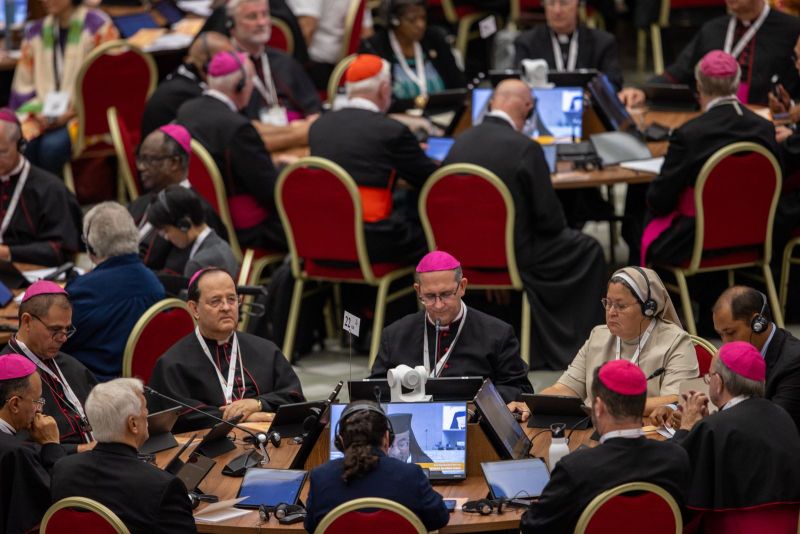The Upcoming Synod and the Media

Image Courtesy of Before It’s News
By Kristijan Jakominich
This is an independently submitted op-ed for our Quill section. Views and statements made in this article do not necessarily reflect the opinions of The Tower.
In Rome, the Church has summoned a select group of faithful, from cardinals to laymen and women, to discuss the pastoral direction of the Church and certain concerns brought forth during the synodal process.
This has been looked at with equal parts excitement and anxiety by both progressive members of the Church, who seek to upend the traditional teachings and practices of the Church, and more traditional members, who fear exactly such a thing happening.
The selection of representatives, including figures spanning from Bishop Robert Barron to Father James Martin, suggests that the Holy Father seeks to have an even representation of both sides to advise him. The issues to be covered prominently include the position of women in the Church and female ordination, and questions regarding those with same-sex attraction and pastoral strategy regarding them.
Clearly, these issues are controversial and any result is likely to cause, even in the best scenario, massive upheaval within the Church one way or another. This is nothing new, of course. The Church has seemingly been in upheaval for its entire history. The question as to why this is the case finds many answers. One that goes unnoticed, and plays an important role in the current day, is the role the media plays in reporting on the Church, and the way in which it does so.
During the convening of the Vatican II, the media was keenly focused on the events transpiring. There was an idea, not substantiated by the Council itself, that it would “modernize” the Church, and bring about great changes to its teachings and practices, as with the liberal theological revolution that had occurred earlier in the century in the mainline Protestant denominations (ie, Lutheranism, Anglicanism, etc.).
This expectation led the media, which was sympathetic to such an development, to overplay any given lead to that end or promote the idea that this was occurring. In an ironic twist, this led many Catholics, including some in the hierarchy, to believe that was indeed what was happening. This, not the documents themselves, led to the so-called “spirit of Vatican II,” the liturgical and theological chaos that occurred in the 70s, which we still feel to some extent today.
Recently, five cardinals of the Church submitted doctrinal questions to the Pope, called dubia, regarding several hot-button issues. One of these regarded the blessing of same-sex couples. For context, the Dicastery of the Doctrine of the Faith, the body that handles Church doctrine, had previously stated a couple of years ago, in response to the German “Synodal Way” approving such blessings, that the Church cannot and will never bless such a union, as it deems it inherently sinful.
The Pope gave an answer that gave clear indications that the Church would not give any blessing that could be misconstrued as a pseudo-marriage, reinforced the traditional position on marriage, and largely left individual cases to individual priests for pastoral necessity, while saying that any blessings are aimed to conform the recipient to Christ.
The media, however, took a perceived vagueness and ran with it, with headlines like “Pope Francis opens possibility for blessing same-sex unions” or that “Pope Francis open to Church blessing gay couples.”
Reading the actual documents, with the context of the previous judgment, which Pope Francis approved, this is not the case. In any regard, it caused a scandal among the uninformed faithful who took these headlines seriously and caused many more questions to arise.
What is all this to say? With the Synod ongoing, the media is almost sure to take whatever they can get and twist it however they want. It happened before, and it will certainly happen again.
My advice to the reader is to shut your ears, do your research, and pray for the Church. The media, even some Catholic sources, are not friendly to interpreting the Church’s teachings. They often have a political or social agenda that supersedes loyalty to principles of journalistic integrity or proper theology.
Only read that which the Church itself releases. It, not its biased interpreters, are how you should learn what is taught. Against both progressives and ultra-traditionalists that would say the Church has changed its teaching on a given subject, it is a fact that the Church’s teachings, though they may develop in given ways over time, cannot change fundamentally. It would be like saying gravity has fundamentally changed as a law of physics: it’s impossible.
Furthermore, we should all pray for the Church, as we are able. Every moment spent worrying is a moment that can be spent in prayer, and the anxiety or hope one feels shouldn’t be a cause for despair or presumption, but rather a source of energy to pray.








